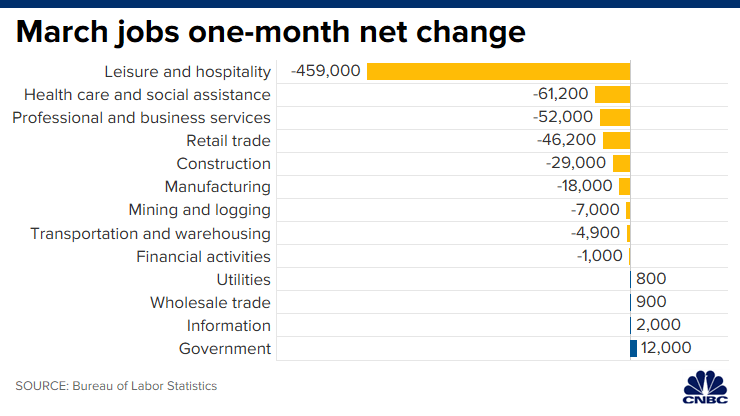COVID-19 ravages economy, leaving over 20 million Americans unemployed
CNBC
The leisure and hospitality industry faced a massive unemployment shock in March due to COVID-19.
May 3, 2020
Over the past month, the Department of Labor released data revealing a record-breaking 20 million Americans losing their jobs as state legislatures –– in compliance with the federal government –– issued orders to shut down non-essential businesses and shelter in place.
To put that figure into perspective, the Department of Labor statistics state that weekly unemployment filings during the Great Recession peaked at 620,000 in 2009. From March 21 to 28 of this year, a total of 6.6 million unemployment claims were filed. Although total unemployment numbers have yet to eclipse those of 2008, economists believe the worst is yet to come.
“As businesses attempt to maneuver through these times, I suspect unemployment will spike [even higher],” Chief Economist of Zillow Svenja Gudell said.
Economic policy in response to the COVID-19 pandemic has hit the retail, hospitality and gig industries hardest, leaving Uber drivers, Doordashers and other contractors jobless. According to the Department of Labor, workers from the hospitality industry account for over 66% of unemployment claims; Macy’s, JCPenney and Kohl’s have collectively furloughed hundreds of thousands of workers.
“At the end of the day, cash is king and that causes businesses to make difficult decisions,” Lisa Hufford, CEO of contracting firm Simplicity Consulting, said.
Looking into the future as the shelter in place order is lifted and the economy begins to recover, economists believe that jobs will slowly trickle back in. While this is true, the economy will remain far from unscathed. Department of Labor data indicates that nearly 700,000 jobs have been completely eliminated from the workforce, meaning that businesses have declared bankruptcy and are not expected to recover after the pandemic.
There is, however, a dim light at the end of the tunnel for the millions of Americans that have suddenly found themselves unemployed and struggling to make ends meet.
Congress recently passed an economic stimulus bill that has been distributing over $2 trillion to individuals, small businesses and corporations in an effort to reinvigorate the currently fledgling economy. According to the legislation, unemployed Americans can qualify for up to a $1,200 one-time payout, subsequent monthly payouts of up to $400 for four months and full reimbursement by the state for wages that could not be collected, among other funds.
In addition to government stimulus, economists find solace in the fact that businesses have devised new ways to accommodate for shelter-in-place policies in order to mitigate furloughs and layoffs.
“We are seeing a rise in the utilization of teleconferencing software and remote working. Technology and work culture have evolved to maintain the economy,” Badri Narayanan, an economist at McKinsey Consulting, said.
Moreover, companies such as Uber, Lyft and Doordash have been providing financial assistance to their contractors.
“We are providing our drivers with health insurance and other benefits … and we do believe that business [for our workers] will recover,” Nelson Chai, Chief Financial Officer of Uber, told NBC.
The situation for many Americans may seem dire, but policymakers and business owners alike are working to support the unemployed, adapt to this new reality and revitalize the economy.
“We have to be creative and innovative to make transformations for good,” Hufford said.


